This content was published: March 31, 2014. Phone numbers, email addresses, and other information may have changed.
Governor uses Rock Creek to sign important education bills
Photos and story by James Hill
Portland Community College welcomed Oregon Governor John Kitzhaber to its Rock Creek Campus on March 11 where he signed two important education bills.
Signed ahead of a joint meeting of the Higher Education Coordinating Commission and the Oregon Education Investment Board, Gov. Kitzhaber put pen to paper to put House Bill 4116 (the “Aspirations to College” bill) and Senate Bill 1524 (or known as the “Study of Free Community College”) into law. Dozens of students in the PCC Foundation’s Future Connect Program gathered around the Governor to watch him sign the bills in front of gathered media and legislators. He said the signings were part of the state reaching its “40-40-20” goals to ensure access for people to post-secondary education and attain degrees.
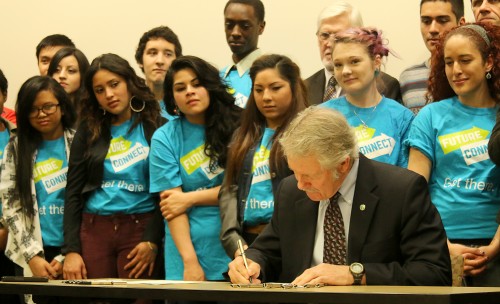
Dozens of students in the PCC Foundation’s Future Connect Program gathered around the Governor to watch him sign the bills in front of gathered media and legislators.
“Both of these bills underscore the importance of education to career pathways for young people,” said Gov. Kitzhaber. “And of course education is key to reducing the achievement gap, moving people out of poverty and up the income scale. I think both of these bills reflect our values as Oregonians and I think many Oregonians will reap the benefits of these bills in the years ahead.”
The State Legislature passed House Bill 4116 the prior week and will provide $750,000 in strategic investment to community colleges across Oregon. PCC’s Future Connect Program, offered in partnership with the cities of Portland, Beaverton and Hillsboro, serves as the model for “Aspirations to College.” Future Connect works with area high schools to provide scholarships and college success services to low-income and first-generation college students.
“We are very proud of our Future Connect Program at PCC,” said College President Jeremy Brown. “With its career counseling, academic advising, internships and other career development opportunities it’s a remarkable case study for Oregon’s educational attainment and economic development strategy.”
The signing on SB 1524 begins a study as to whether it’s feasible to extend two years of free community college education to students that complete high school. Within that two-year time period, students could obtain an associate’s degree, a certificate of learning, or earn credits that can transfer towards a bachelor’s degree at a four-year university. If the HECC finds the concept doable, the commission will propose criteria to the Oregon Legislature.
“The new reality is that we are in a global economy and Oregon is one of the first states to embrace this,” said State Sen. Mark Hass, the bill’s sponsor. “And we’re doing it smartly by taking on this technical study to look at how we should set this up and, hopefully, how we will implement this when the legislature meets next year. It is the least we can do to provide opportunities for the sons and daughters of our state.”
Currently, Oregon community college students pay an average of nearly $4,000 per year in tuition and fees. That price tag serves as a barrier for students who cannot afford higher education. For those who do enroll in school, many end up with student loan debt.
“Future Connect gave me the opportunity to be more than what I envisioned,” said PCC student Sara Agoot, who plans to be a doctor. “I’m getting closer to my dreams because of Future Connect.”


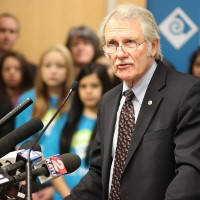

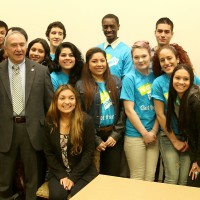

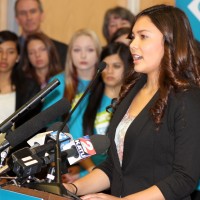
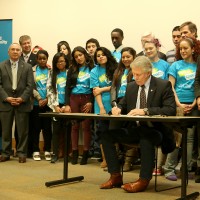
[…] Not bad for a day’s work. For more on this huge day for students, visit: http://news.pcc.edu/2014/03/governor-signs-bills/ […]
[…] There’s no better advocate of students in the state of Oregon than Governor John Kitzhaber. He proved that during a special meeting of the state’s education leaders at the Rock Creek Campus in March where he signed House Bill 4116 (the “Aspirations to College” bill) and Senate Bill 1524 (or known as the “Study of Free Community College”) into law. A crowd of state leaders, PCC faculty and administrators, and Future Connect students cheered the Governor as put pen to paper and to put these important laws on the radar. House Bill 4116 earmarks $750,000 in strategic investment to community colleges across Oregon with PCC’s Future Connect Program serving as the model. SB 1524 orders a study to explore whether it’s feasible to extend two years of free community college education to students that complete high school. Not bad for a day’s work. For more on this huge day for students, visit: http://news.pcc.edu/2014/03/governor-signs-bills/ […]
Hm. I’m into this and everything, but the facts remain: no financial aid for students enrolled. I’d almost rather have FAFSA funds than mostly-free ed. Any opinions on this would be great. I’m not sure what to think. Perhaps if anyone has an opinion, you could talk about it at PCC’s student newspaper.
pccbridge.com
Wow. PCC needs $750,000 of the tax payers’ money (my money) to do a study? PCC should do their feasibility study without the tax payers money and use their own money.
I agree, Jon. This whole thing is wonderful if FAFSA continues to exist. Why haven’t they asked students about this?
Hi Jon,
Sorry for the confusion. HB 4116 isn’t a study. It’s real resources that will provided as competitive grants to community colleges across Oregon to build out programs that provide not only access but to success to lower income students. Programs like PCC’s Future Connect are leveraging City Resources and private, philanthropic support. Here’s another article: http://www.oregonlive.com/hillsboro/index.ssf/2014/02/future_connect_model_program_h.html. Thanks for your comment!
I’m with you Jon. Better access would be attained through decreased taxes and tuition, not the opposite. When the government grants more money to college students, tuition always increases (as well as taxes).
Aye, you couldn’t have put it better, Mark. That’s just the ticket–but the government only does the opposite. I like Kitzhaber from the very little I know of him, but this new bill set is just over the top. Reduce other stuff, not increase the amount of money going to students. Financial aid is so much more helpful–sure, there are people who can’t afford to be in college, but if we completely switch around and expect taxpayers to give more out of their checks, you might as well set fire to an oil field. Money goes in, money comes out. It’s not economically sustainable and just you wait, this’ll stand for a little while and then the lawmakers will get some sense to see reality as it is. By thenhow much money will we have taken out of our salaries…?
thats great and all but what about those of us already in school? Im 30. Have 4 kids and my parents dont have high school deplomas nor a college education and since im not fresh out of high school i get to rack up loans? Why cant they use that money to lower EVERYONES cost of attendance instead of giving free college to SOME people use that money to help everyone going.
Why do these students need free college if they are low-income? Don’t they qualify for FAFSA? If they are still in high school doesn’t the high school pay until you graduate?
I am a member of the Future Connect Program and was there at the ceremony (girl with the poofy red hair) and I, coming from a low income family, didn’t have a lot of hope for college until Future Connect. I was already graduated from high school when Future Connect recruited me and have flourished with the resources provided to me by the program. I did receive FAFSA money but it wasn’t enough for me to attend full time. Personally I think this money is granted to us with a good cause in mind. Whether surrounding circumstances are fair or not is another issue entirely.
I understand your point of view here, but surrounding circumstances ARE the key issue here. This is straight from our paychecks, from YOUR paycheck in taxes. FAFSA can’t help everyone, unfortunately, but it’s a one-or-none deal. You can’t have both FAFSA and the Connect. I’m not in favor of this bill, but I can see where your’e coming from. I work as an editor for The Bridge (pccbridge.com), and you’re free to share our opinion there.
Many thanks,
J. Maes